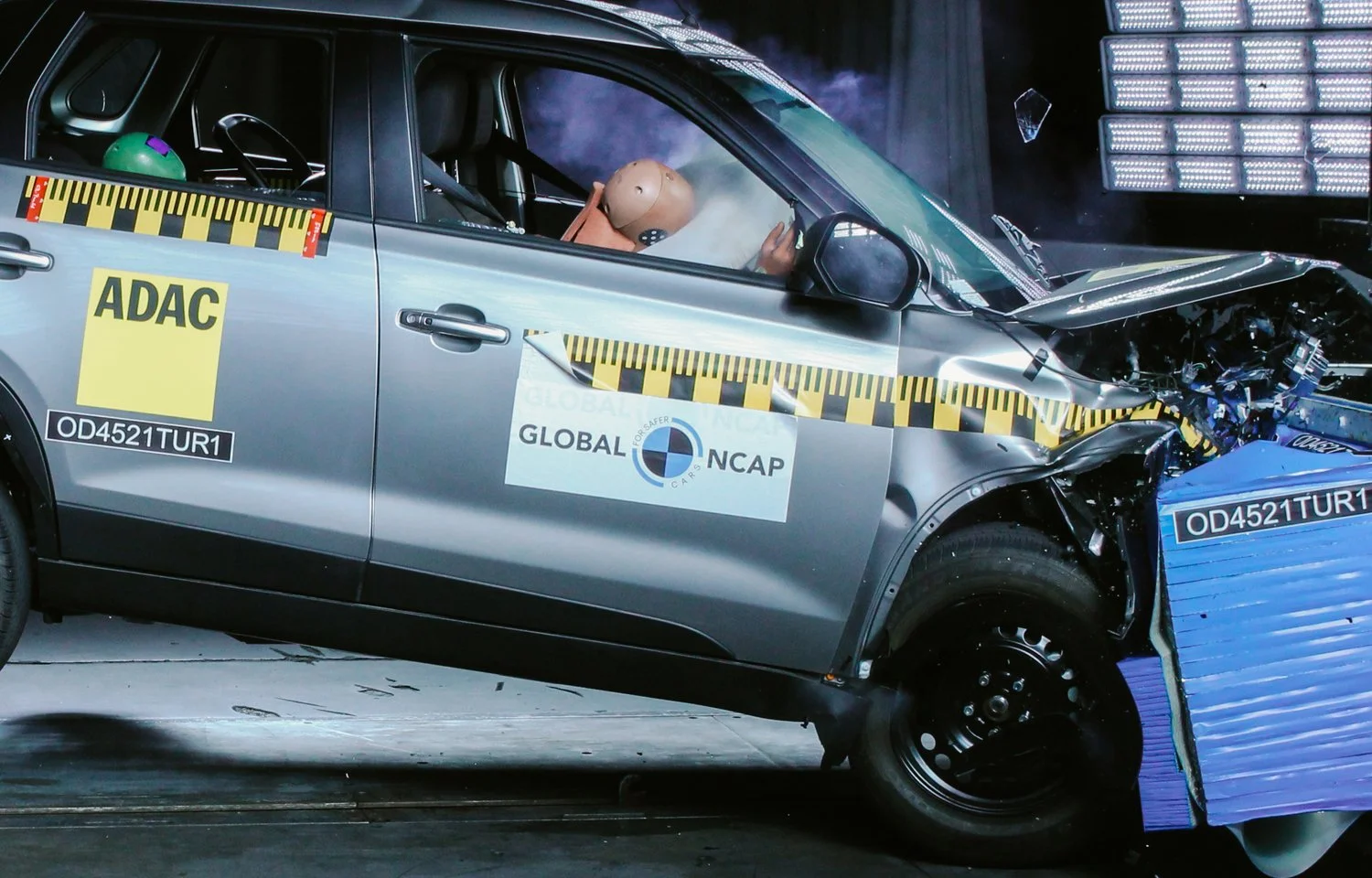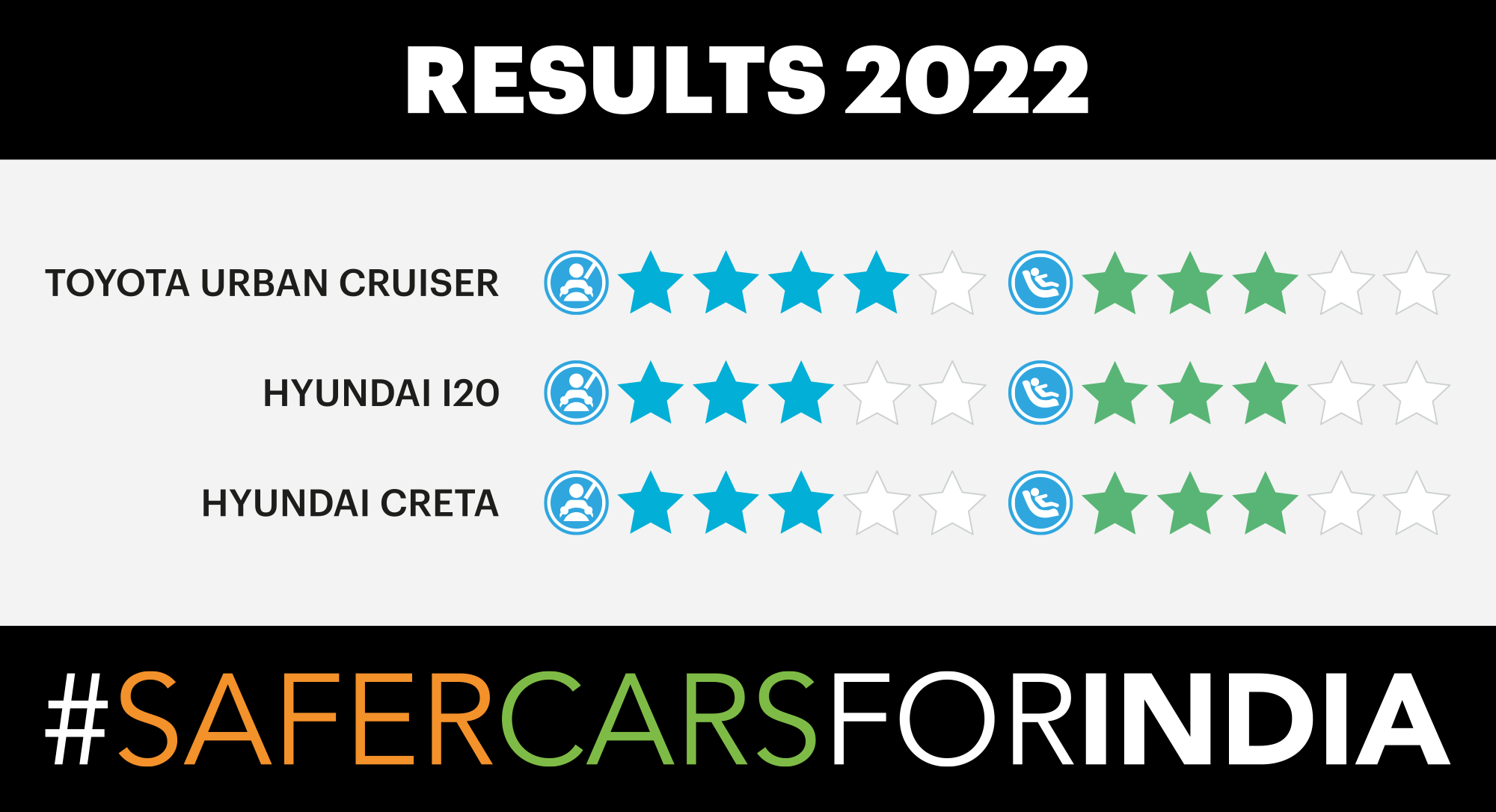Four stars for Toyota Urban Cruiser and three for Hyundai Creta and i20 in latest Indian crash test results
Global NCAP launches the second round of 2022 #SaferCarsForIndia crash tests results today with Hyundai i20 and Creta scoring three stars for adult and child occupant protection and the Toyota Urban Cruiser reaching four stars for adult and three for child occupant protection.
For the #SaferCarsForIndia project, Global NCAP currently tests frontal crash protection for occupants and not side impact, Electronic Stability Control (ESC) and pedestrian protection. These requirements will form part of new Global NCAP assessment protocols from July 2022.
Alejandro Furas, Secretary General of Global NCAP said,
“Although the overall star rating of these models might seem reasonable, the continued reluctance of manufacturers like Hyundai and Toyota to equip safety systems such as ESC and side body and head protection airbags as a basic requirement in India is disappointing. This is why Global NCAP welcomes the Indian government’s initiative of increasing side impact protection requirements and why Global NCAP will update its test protocols as from July. Success in the rating assessment will then only be possible if these improved safety features are included as standard.”
David Ward, Executive President of the Towards Zero Foundation said,
“We have seen steady progress in the safety rating of models tested in India over the last six years. It’s been especially welcome that domestic automakers in India have risen to Global NCAP’s safety challenge. Global players like Toyota and Hyundai should follow their lead.”
Hyundai Creta (2 airbags)
The Creta was tested in its most basic safety spec fitted with 2 frontal airbags and ABS. It recorded an unstable structure and the risk of injury to the lower legs and feet of the driver. Lack of ISOFIX anchorages and 3 point belts in all seating positions explains the child occupant protection results. Global NCAP was surprised to see in such a new model the lack of 3 point belts in all seating positions, lack of ESC and no side head impact protection as standard.
Read the full crash test report
Watch the crash test video
Download crash test image
Hyundai i20 (2 airbags)
The i20 was tested in its most basic safety spec fitted with 2 frontal airbags and ABS. During the assessment it showed an unstable structure, a risk of the driver airbag not fully protecting the driver’s head and weak protection to the driver’s chest. Despite using the ISOFIX anchorages to install both Child Restraint Systems (CRS) the 3 year old dummy showed high deceleration in the head during the crash. It surprised Global NCAP that this model is still being sold with a lap belt (all seating positions should have 3 point belts) in the rear centre seat, no ESC and no side head impact protection as standard in comparison to the same model in Europe that offers Autonomous Emergency Braking (AEB) as standard equipment.
Read the full crash test report
Watch the crash test video
Download crash test image
Toyota Urban Cruiser (2 airbags)
Toyota’s Urban Cruiser was tested in its most basic safety spec fitted with 2 frontal airbags and ABS. During the assessment it showed a stable structure, and adequate to good protection of critical body regions of the adults. The CRS installed using the ISOFIX anchorages showed good protection of both child occupants. The lack of 3 point belts in all seating positions and the high neck biomechanical values in the frontal crash explain the three stars for child occupant protection.
Read the full crash test report
Watch the crash test video
Download crash test image
Note to Editors
Safer Cars For India Campaign
The #SaferCarsForIndia Campaign was launched by Global NCAP in 2014 with the objective of promoting safer vehicles in the country. Between 2014 and 2022 Global NCAP has completed more than fifty three safety assessments which have acted as an important catalyst in the safety improvement of Indian cars.
www.globalncap.org
Global NCAP is a major programme of the Towards Zero Foundation, a UK based charity working internationally in support of the new UN Decade of Action for Road Safety, with a goal of halving road deaths and serious injuries by 2030.






